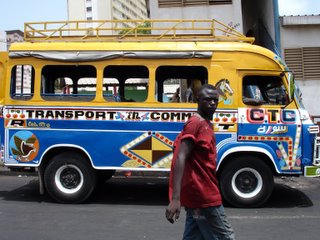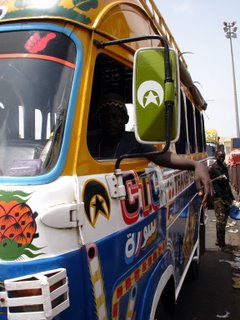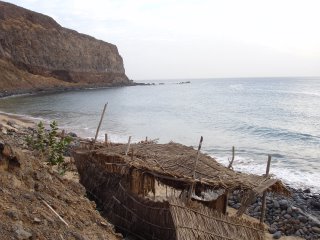

Taking Dakar’s buses, the diagen-djiaye, is an art. They hurtle up and down the Route de Oukham, from town at one end and past the turning to my house at the other. They are run by groups; a driver and two ‘apprentis’, dusty-faced boys who hang off the back shouting their destination “dakadakadakadaka” for town and “wakawakawakawaka” for my end of the route. These boys can look around ten years old and be as mean as anything.
The buses are in bad shape and you can always hear them coming. Their rattling tin structures are held together by people, five to a row, ten rows, two passengers in the front with the driver. The only exits are at the back and at the front, and no alley for passing through the bus. So if you get in, you have to make quite sure that you don’t want to get out very quickly. They do not let you stand and if one person climbs out, everybody has to up and advance “advanadvanadvan” through the bus until the seats are filled again, with more entering the back until the whole bus is full, “fesnafesnafesna”.
When you want to get off, you stand and tap a coin noisily on the roof and shout “maima”, ‘let me off’, until the driver slows down. Sometimes he doesn’t want to stop and then old men and fat women start shouting “maiko”, 'let her down', in a crescendo, sometimes in chorus, sometimes in harmony, until he is forced to pull over. You must always grumble when getting out, either about the time it took for the driver to stop or about the change the apprentis gave you, as the fares are fixed but no one knows what they are and they differ from bus to bus.
The floor of the bus has holes in it to give you the Chessington World of Adventures feeling. There is nothing more fun than to watch pot holes disappear at speed underneath you.
The front of the bus is plastered, usually seeping half way down the windscreen, in photos of religious idols and pop idols. Cheikh Ibra Fall stands in austere dress next to Viviane N’Dour in threads of lycra. He is bony because he lived a life of hard work in devotion to his spiritual guide. She is bony because otherwise she wouldn’t fit into her dress.
At night time the buses are packed more than usual with people going home from work and a bare light bulb lights the inside, swinging to and fro and knocking people’s heads when they stand up.
A fat lady climbs in next to me. She is wearing a pale blue bouboub widely cut across her shoulders so that her bra straps are showing, her shoulders and much of her back. I can almost feel the cushion of her skin and she smells of perfumed water. With her bra straps she is saying ‘I have nursed ten children and will nurse their children too’. She all but smothers me in her folds of flesh and, perching on the middle tip-up seat which accommodates only the smallest of bottoms, I squash up next to my neighbour on the other side and apologise for all but smothering him. He doesn’t seem to mind.
The apprentis starts shouting “passpasspasspass” for us to pass back our fares. Each coin travels ten rows, from hand to hand, the apprentis prodding the fat lady with a dirty finger, and her fleshy fingers poking the bony man infront, and he tapping the girl in a headscarf infront of him and she pointing to the boy two rows infront of her until the passenger has been identitfied, says where he is going, argues with the apprentis about the price, then reluctantly passes back a coin, from hand to podgy hand until it reaches the apprentis who roots around in his pencil case, finds the right change, prods the fat woman and gives her the coin which moves deftly along the rows until it reaches its rightful owner. With one passenger taken care of, so the next must be attended to.
“This is gymnastiques,” says my neighbour, a young man coming home from college. My stop comes and I bang on the roof. The fat woman shouts “mai-ko” and the driver slows down. She starts grumbling and I have to climb over her because she refuses to move. I cut my leg on a shard of metal sticking out from one of the seats.
Just as I start to climb down the wooden boards at the back of the bus, the driver moves off. "Mai-ko" they all shout and the apprentis rings a bell loudly. I grab hold of the ladder which is partly attached to the back and swing down onto the road, which has started moving. The bus behind advances towards me and I am engulfed in fumes from my own bus. This is all part of the diagen-djiaye experience.


